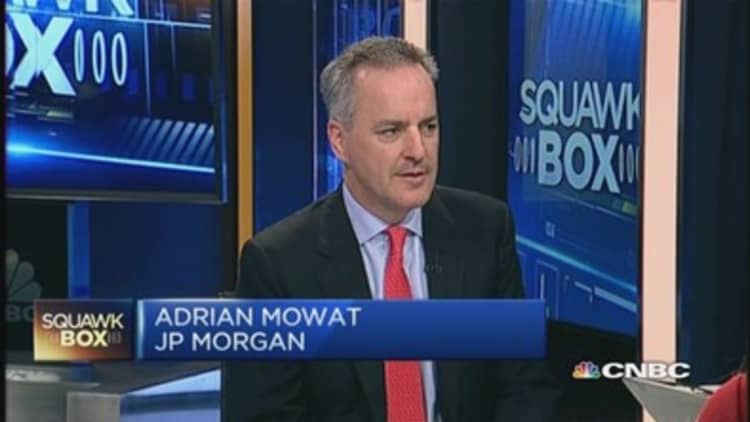Following the stupendous rally in Chinese equities in 2014, JPMorgan downgraded the market to "neutral" from "overweight" over the weekend, citing deteriorating economic growth and signs that investors may be losing faith in the effectiveness of policy easing.
"What unnerved me was this RRR (reserve requirement ratio) cut having no effect on the market," Adrian Mowat, chief Asian and emerging market equity strategist at JPMorgan told CNBC on Monday.
Last Wednesday, China's central bank made its first system-wide cut to bank reserve requirements in over two years. It reduced the amount of cash banks are required to hold as reserves by 50 basis points to 19.5 percent in a move that is estimated to unlock 600-650 billion yuan ($96-104 billion) in liquidity.
The market, however, shrugged off the move, with the benchmark Shanghai Composite moving lower on Thursday and Friday.
"The failure of the market to respond may indicate that the market's belief in policy is waning," he said.

JPMorgan had upgraded China to overweight on November 17 2014 on expectations that policy speculation would drive a rally in the market, which it deemed cheap. Days later, the People's Bank of China cut the benchmark lending and deposit rates, triggering a 35 percent rally in the benchmark index through mid-January.
The market has underperformed its peers this year, down 5 percent year-to-date, compared with MSCI Emerging Market Index's 1.8 percent gain.
Like the market, the world's second largest economy has also started the year on the back foot. After growing at its slowest pace in 24 years in 2014, China's latest economic data point to a continued loss of growth momentum in the first quarter.
China bull
Not all are turning cautious on the market, however.
Stephen Sheung, head of investment strategy at SHK Private said the market's reaction to the RRR cut last week has not altered his bullish outlook for the market.
"Our interpretation is the market had already priced in more PBoC (People's Bank of China) easing since the rate cut last November," he said.
Read MoreChina stocks consolidating, but uptrend still strong
"In addition to this, it appears that liquidity is still pretty tight leading up to Chinese New Year. Also, we have several IPOs coming up this week, which is removing funds from the secondary market and moving them back to the primary market. That's why we haven't seen a positive reaction in stocks," he said.
The next catalyst for the market could be the National People's Congress (NPC) in early March, he said.
"The NPC meeting is normally a period when a lot of new policy measures are launched – this could be a game changer for the market in the first half," he said.
Fresh monetary stimulus will also support the market, Sheung said, who expects the Shanghai Composite to end the year at 3,280 or 6 percent above current levels.
"The PBoC will still be pretty accommodative moving into second quarter," he said. "There's a really strong need to stabilize growth because a lot of targets set out in the 12th Five-Year Plan – which ends this year - will be hard to achieve otherwise."
Shared optimism
Sheung wasn't alone in his optimism.
Minggao Shen, economist at Citi said the majority of the 50 institutional investors he spoke with during a recent trip to Europe were surprisingly more positive on China than he expected.
"Approximately 70 percent of the clients we met had a slightly positive stance on China, which contrasts with the negative stance of 70 percent of the investors we met in the U.S. in October 2014," Shen wrote in a note on Monday.
"European clients recognized that the recent economic growth was weaker than the official GDP (gross domestic product) data suggested, and anticipated policy easing via either monetary loosening or currency weakening," he said. "Fewer clients mentioned a hard-landing scenario in this trip than in our previous trips."


